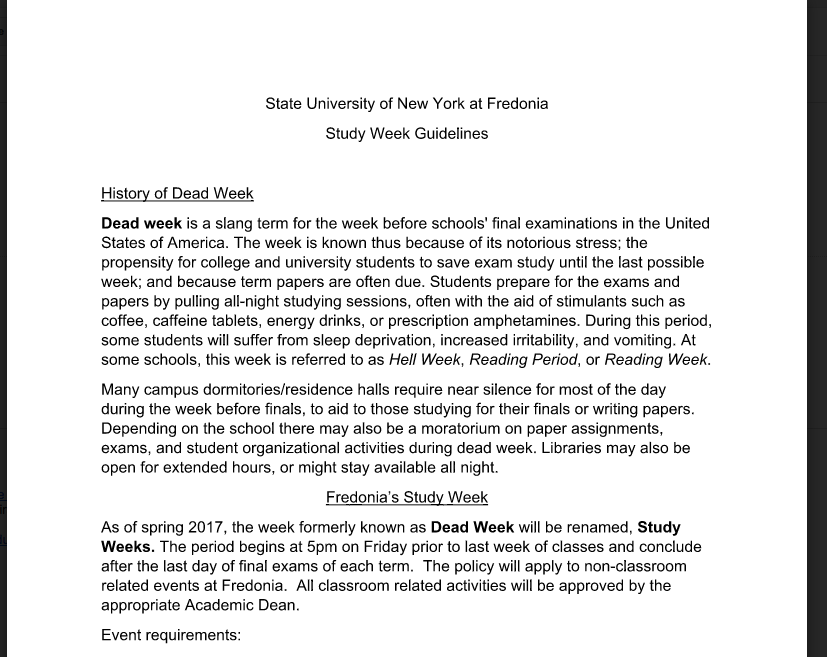
CONNOR HOFFMAN
Managing Editor
Last week, Student Affairs sent out an email that detailed the history of Dead Week and stated that Dead Week is now to be called “Study Weeks.” This email seemed like a relatively mundane name change, but it has generated a lot of controversy.
Much of this controversy has been over the fact that the history of Dead Week was seemingly lifted completely from the Wikipedia page.
“Dead Week is a slang term for the week before schools’ final examinations in the United States of America,” the email explained. “The week is known thus because of its notorious stress; the propensity for college and university students to save exam study until the last possible week; and because term papers are often due. Students prepare for the exams and papers by pulling all-night studying sessions, often with the aid of stimulants such as coffee, caffeine tablets, energy drinks, or prescription amphetamines. During this period some students will suffer from sleep deprivation, increased irritability and vomiting.”
Aidan Licker, a senior audio/radio production major, quickly noticed that the first half of this email seemed to be taken completely from Wikipedia.
“The first half of the attached document was clearly copied and pasted from the Wikipedia page about Dead Week,” said Licker in an online interview. “At an educational institution where plagiarism is taken very seriously, it is a shame to see our ‘professionals’ behave this way. In most classes, students aren’t even allowed to use Wikipedia as a source, let alone plagiarize it.”
Vice President for Student Affairs Cedric Howard explained that “it could very well be” that the history of Dead Week portion of the email was taken from Wikipedia. He explained why he doesn’t believe that it constitutes plagiarism.
“Plagiarism is presenting some work as though it was yours. This is not me presenting some work for me,” said Howard. “This was trying to provide some context of how this connects to what other people are doing … This was not meant to be a scholarly report or even an assignment. If I knew it was going to create that I would have sent out the original part I made and just send it out to campus.”
On Monday morning, Student Affairs sent out an email apologizing to those who were offended by the lack of citation in the email.
“The Office of Student Affairs accepts responsibility for not providing proper citation of a set of guidelines entitled, Fredonia’s Study Week. The guidelines were developed to provide clarification of existing campus practices,” wrote Student Affairs in their email. “The use of any material without acknowledgement of source is a serious concern, and a poor example for our students. In future correspondence, my office will ensure proper citation of all work.”
Howard explained that the entire purpose of this email was to clarify what Dead Week is and what the policies are because there was no formal policy on Dead Week. In years’ past, it was informally up to the vice president to decide what events were allowed to go on.
Some students, including Licker, also were annoyed over the tone that the email took and argued that the policy change doesn’t make much sense.
“Another thing to note is that there were some horrible things mentioned about how Dead Week affects students like sleep deprivation, and even stress-induced vomiting, and there was no comment made about how this could be prevented for that stressful week,” said Licker. “In addition to the plagiarism, we were given a new list of guidelines as to how to go about requesting a non-classroom event during Dead Week and finals week, which included a written proposal due by the first week of March. However, the implementation of these guidelines showed not to go into effect until April 1, 2017. So, this whole email was a mess, and I hope to see some sort of apology or repercussions for it.”
Jorian Holka, a senior exercise science and sports management major, feels like changing the name of Dead Week is not necessary and that it won’t change anything.
“Logically, I can’t see any academic reason for the change of Dead Week to Study Weeks,” said Holka in an online interview. “Unless the administration truly believes that lengthening this period and changing its name will result in more students doing well on their finals (which is absurd), it stands to reason that this is nothing more than another poor attempt at cracking down on activities and festivities related to Fred Fest (or ‘the weekend formerly known as Fred Fest’).”
Student Association President Josh Ranney feels that the change is a positive change for the campus.
“I think it’s a positive idea. I know this is something that had been discussed for a number of years and it’s exciting to see that the University finally made it official,” said Ranney, a sophomore political science and journalism dual major, in an online interview. “It’s hard to argue that the phrase ‘Dead Week’ is excessively ominous during an already stressful week.
Howard explained that the email really was meant to clarify what the campus’ policy was and not to offend anyone.
“The only reason that [the first half of email] is there is because people were like, ‘Why do we call it Dead Week?’,” said Howard. “Well, I don’t know, I wasn’t here. The second aspect is why do we have it. That’s a great question. There’s no written document. Only thing that I was trying to do was provide some context of what other schools are doing … this is not me changing a policy. This is just me providing some clarification to say if you were to do an event during this time these are all the things we ask of you, other than just saying no.”
The name change to Study Weeks became effective on April 1. The same basic policy is in effect, but it will no longer be called Dead Week.
